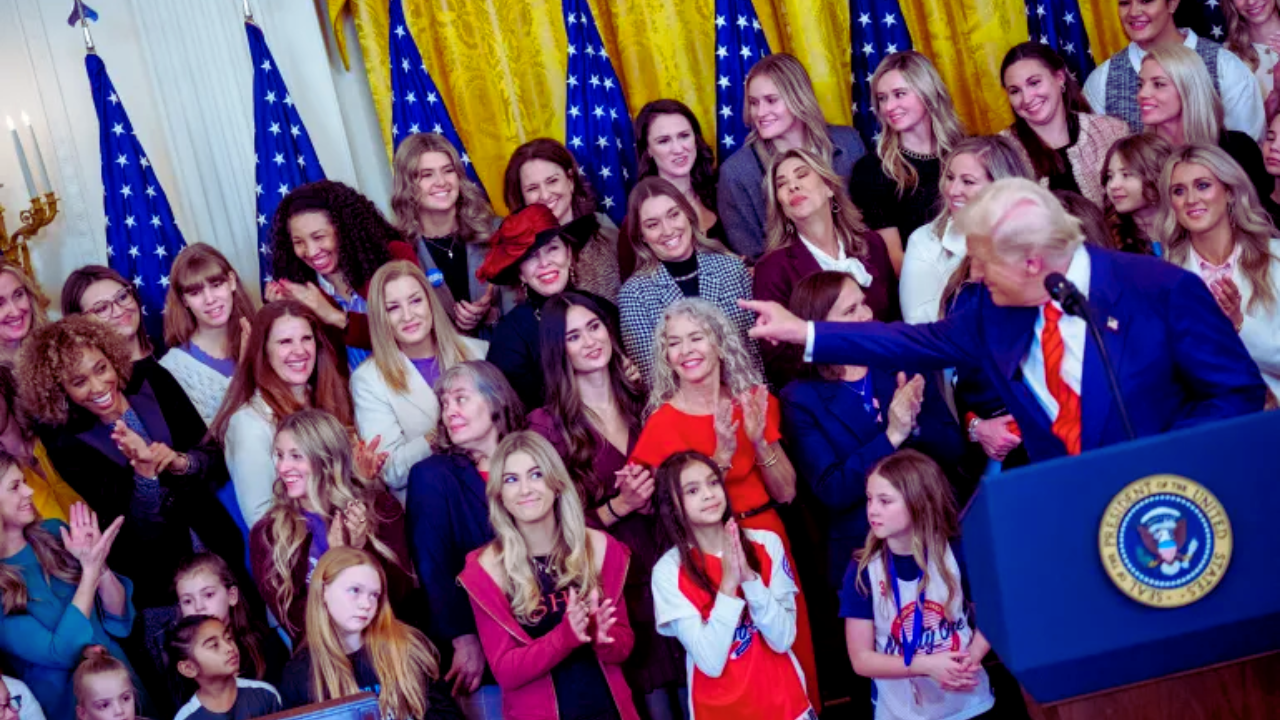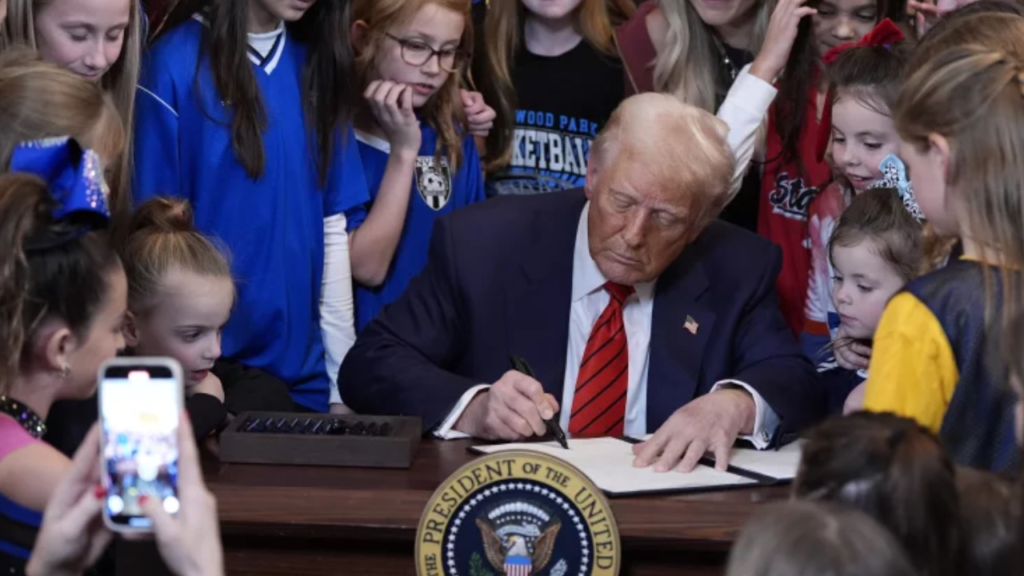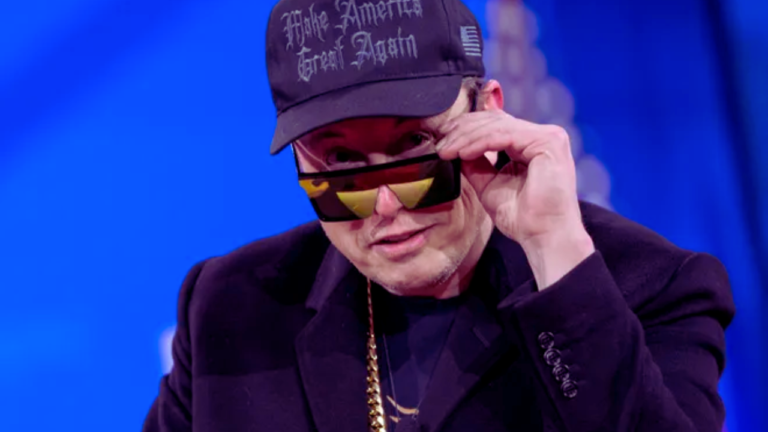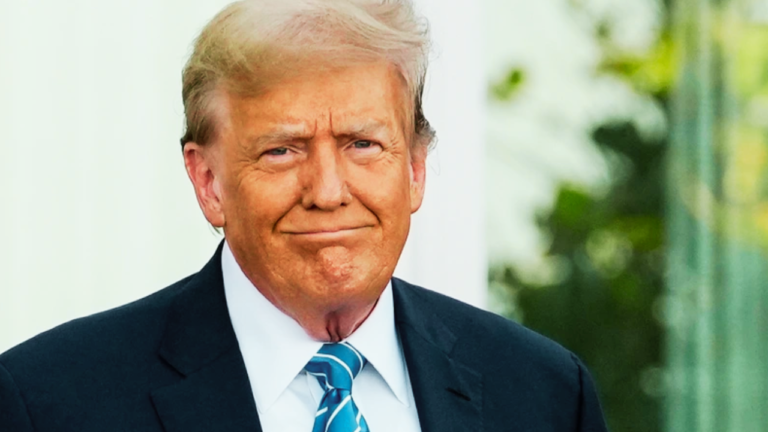
US President Donald Trump signs the 'No Men in Women's Sports' executive order on February 5 in the East Room of the White House, in Washington, DC, the United States [Andrew Harnik/Getty Images via AFP]
Donald Trump’s Executive Order on Transgender Athletes Faces Constitutional Challenges After Title IX Reinterpretation

President Donald Trump’s executive order to block transgender women and girls from competing in female sports has sparked significant controversy and legal challenges. This order, which aligns with Trump’s campaign promise, is creating a wave of investigations into federally funded schools and athletic organizations. The ruling has also led to a broader debate about transgender rights and sports, stirring up strong emotions on both sides of the issue.
The Education Department has acted quickly in response to the executive order, urging sports associations that manage high school and college competitions to strip transgender women of their awards and records. This has added fuel to the ongoing discussion about fairness in sports. Linda McMahon, who has been chosen to head the Education Department, echoed the administration’s position during her Senate confirmation hearing. She expressed her belief that “biological boys” should not be allowed to compete with girls in sports.
This move is not the first time sports organizations and lawmakers have struggled to address the issue of transgender women and girls competing in female sports. For years, there has been a debate about how to ensure fairness while also respecting the rights of transgender athletes. However, the executive order marks a significant shift, and advocates for transgender athletes worry that it could lead to a rollback of acceptance and even more legal battles.
While the controversy has primarily focused on the United States, the order’s impact is being felt beyond American borders as well. The decision is raising questions about equality and fairness in international sports competitions, and how the issue of transgender athletes will be addressed on a global scale.
Legal Challenges Emerge
The first significant legal challenge to Trump’s executive order came in New Hampshire, where a federal judge ruled that two transgender high school students could challenge the constitutionality of the order in court. This legal battle is part of a larger lawsuit seeking to overturn a state law that prohibits transgender athletes from competing on girls’ sports teams. The students, 15-year-old Iris Turmelle and 16-year-old Parker Tirrell, are the plaintiffs in the case, and their legal team is fighting for the right to compete without facing discrimination.
Amy Manzelli, the mother of one of the plaintiffs, Iris Turmelle, expressed her shock and frustration over the situation. “Never in a million years would I think we’d be suing the president of the United States of America,” Manzelli said. “Iris understands the gravity of the situation.” Despite the legal hurdles, Iris, who hopes to try out for her school’s tennis team this spring, and Parker, who is already playing on her school’s soccer team, are allowed to continue participating in sports while their case moves forward. A preliminary injunction has been issued, allowing the students to compete as their lawsuit proceeds through the courts.
The ACLU and Legal Advocacy
The American Civil Liberties Union (ACLU) of New Hampshire is playing a key role in representing the plaintiffs. Henry Klementowicz, the deputy legal director at the ACLU, explained that the lawsuit is arguing that the students are being discriminated against in violation of their constitutional rights. The legal team believes that the executive order violates the federal equal protection guarantees under the Constitution and infringes on the students’ rights under Title IX. Title IX is a federal law that prohibits discrimination in education, including sports, based on sex.
The ACLU’s involvement underscores the broader legal and social implications of the issue. The lawsuit is not only about individual rights but also about setting a legal precedent for how transgender athletes are treated in the future. It is part of a larger fight for transgender equality in sports and other areas of life.
The Broader Debate Over Transgender Athletes
The debate over transgender athletes in women’s sports has been ongoing for years, and donald Trump’s executive order has brought it into sharp focus. Supporters of the order argue that allowing transgender women to compete in female sports creates an unfair advantage, especially in competitive events. They believe that because transgender women may have physical advantages from male puberty, they should not be allowed to compete with cisgender women in female sports.
On the other hand, advocates for transgender rights argue that excluding transgender athletes from competing in women’s sports is discriminatory and harmful. They point out that transgender athletes often face significant challenges, including discrimination, violence, and barriers to participation. Denying them the opportunity to compete on a level playing field sends a message of exclusion and reinforces harmful stereotypes about transgender individuals.
Transgender athletes themselves have shared personal stories of how sports have been a vital part of their lives and identities. For many, participating in sports is not just about competition but also about community, self-expression, and building confidence. The debate has highlighted the struggle between fairness in competition and the rights of transgender individuals to be included and respected.
What’s Next for Transgender Athletes?
As the legal battle continues, the future of transgender athletes in female sports remains uncertain. The ruling by the federal judge in New Hampshire is just the beginning of a long legal process, and the outcome could have far-reaching implications for transgender rights in sports. If the case progresses and ultimately reaches the Supreme Court, it could set a national precedent that impacts all sports organizations, from high school teams to professional leagues.
Regardless of the legal outcome, the issue of transgender athletes in sports is unlikely to go away anytime soon. It will continue to be a topic of debate among lawmakers, sports leaders, and the public. With each new legal challenge, the conversation about fairness, inclusion, and equality in sports will evolve. The executive order signed by donald Trump has certainly upended the landscape for transgender athletes, but the fight for their rights and inclusion is far from over.
As the legal challenges unfold, one thing is clear: the issue of transgender athletes in sports will continue to shape the national conversation about equality, rights, and fairness. The outcome of this legal battle could set the tone for how transgender athletes are treated in the future, both in the U.S. and around the world.





